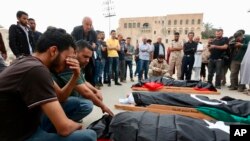The forces of Libya's Khalifa Hifter said Friday that Turkish vessels and interests are "legitimate targets" in its battle to seize the capital of Tripoli, after it accused Turkey of helping rival militias allied with the U.N.-supported government.
The self-styled Libyan National Army, led by Hifter, already controls much of the country's east and south. It launched an offensive against the weak Tripoli-based government in April. The fighting has threatened to plunge Libya into another bout of violence on the scale of the 2011 conflict that ousted longtime dictator Moammar Gadhafi and led to his death.
A spokesman for the LNA, Ahmed al-Mesmari, said the country had "come under illegitimate Turkish aggression" in recent weeks.
"Turkey has become directly involved in the battle (for Tripoli), with its soldiers, planes, sea ships and all the supplies that now reach Misrata, Tripoli and Zuwara directly," al-Mesmari said.
He said Turkey had helped push the LNA out of the town of Gharyan, about 100 kilometers (62 miles) from Tripoli. The town was a key supply route for Hifter's forces pushing toward the capital.
Turkish forces also bombed LNA positions and provided air cover for militias allied with the Tripoli-based government to retake the town, he said.
Al-Mesmari said LNA forces have now been ordered to target any Turkish ships, strategic sites or companies operating in Libya or its territorial waters, and to arrest any Turkish nationals in Libya.
Libyan officials said they had carried out "heavy" airstrikes in retaliation against the fighters who retook Gharyan. They spoke on condition of anonymity because they were not authorized to brief reporters.
The government in the east said LNA forces were killed after being captured alive in hospitals in Gharyan, a claim denied by Gharyan Gov. Yousef Bediri, who is loyal to the Tripoli government.
Bediri called on rights groups to investigate the killing in Gharyan saying the LNA troops were killed earlier during the fighting.
Col. Mohamed Gnono, a spokesman for the Tripoli government forces, told a news conference in Gharyan that they captured over 150 of Hifter's troops and seized armored vehicles, three drones and U.S.-made weapons and missiles.
Oded Berkowitz, an Israeli security analyst who specializes in the Libyan conflict, said "the most interesting and notable" of these seized weapons were FGM-148 Javelin anti-tank missiles, UAE-made Yabhon drones, and Russia-made Kornet anti-tank guided missiles.
"This is a game changer not only because it's a highly advanced weapon, but because it's also American," he said.
Last month, a Facebook page linked to the Tripoli government posted photos appearing to show more than a dozen armored vehicles arriving at port, without saying who supplied them. Supporters of the various militias allied with the government said the vehicles, which resemble Turkish-made Kirpi armored carriers, were supplied by Turkey.
Turkish President Recep Tayyip Erdogan said Saturday he was unaware of the LNA's orders. "If Hifter has given such an order, we'll get that evaluated," he said. He said Turkey had already taken "necessary" precautions.
Erdogan said in April his government would stand by Tripoli authorities as they repel the offensive launched by Hifter's forces.
The U.N.-supported government condemned Hifter threats of targeting Turkey's interests in Libya.
The Government of National accord, backed by Turkey, urged the U.N. support mission in Libya to have "clear positions" toward these "unprecedented comments" by the LNA spokesman.
In a press conference late Saturday, al-Mesmari said their airstrikes would continue on Gharyan and outskirts of Tripoli.
He said LNA forces repelled attacks by militias allied with the U.N.-supported government on towns of Ain Zara and Wadi al-Rabie outside Tripoli.
"Forensic reports showed that wounded in Gharyan hospitals were knifed, shot deal in their heads or rammed by cars," he said.
Hifter, who in recent years has been battling Islamic extremists and other militias across eastern Libya, says he is determined to restore stability to the North African country. His opponents view him as an aspiring autocrat and fear a return to one-man rule.
Hifter has received support from the United Arab Emirates and Egypt, while his rivals receive support from Qatar and Turkey.
The fight for Tripoli has killed at least 739 people, according to the World Health Organization.










